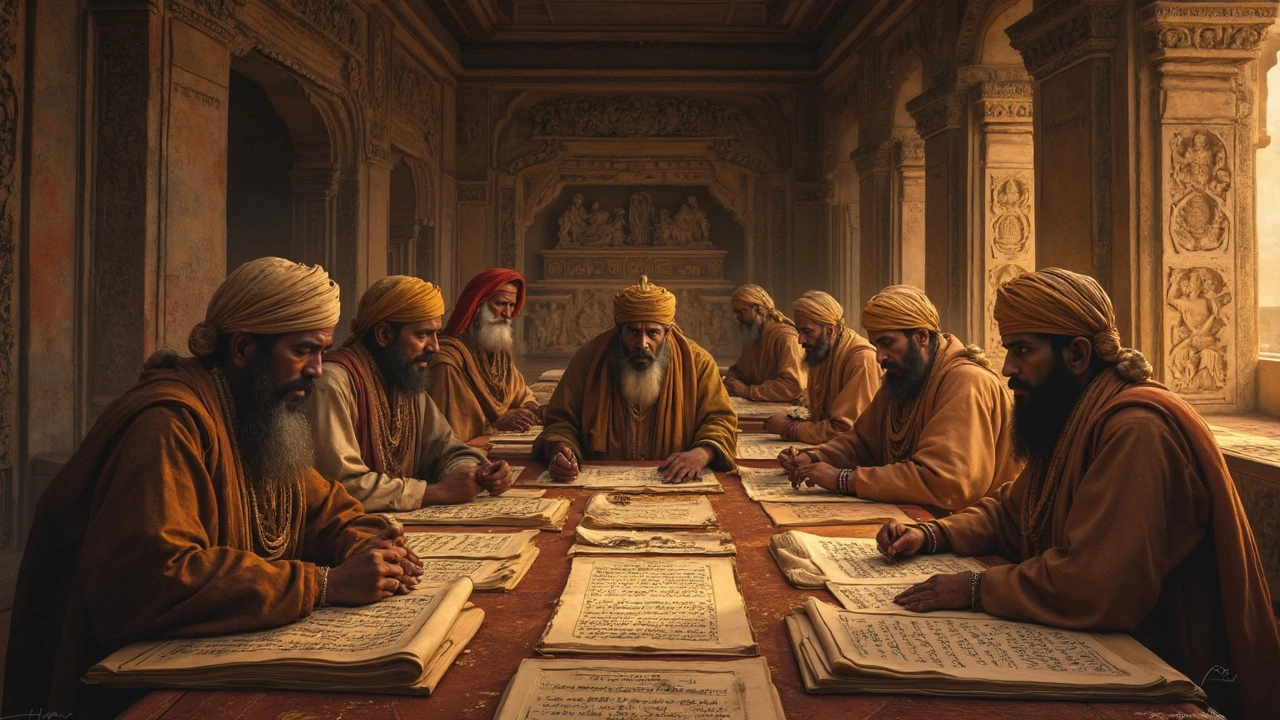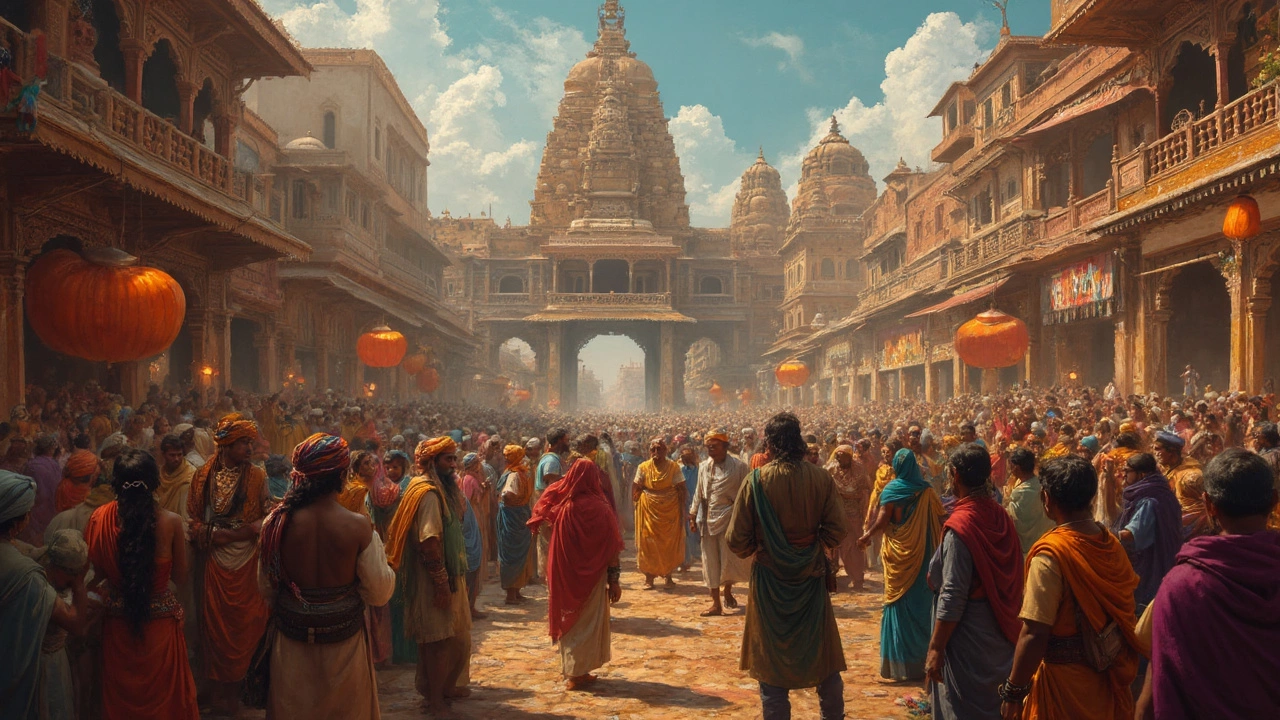Is the Bible Historical Fiction or Something More?
 Feb, 17 2025
Feb, 17 2025
Ever wonder where the Bible stands between history and fiction? It's a hot topic that keeps people talking, especially since the Bible isn’t just another book gathering dust on a shelf. For some, it’s the sacred word of God, but others view it through a more literary lens, sparking debates on whether it fits the bill as historical fiction.
Now, why is this important? Well, understanding how stories from the Bible line up with historical facts—or don’t—can change the way we look at what’s written. The Bible combines theology, history, poetry, and a hefty dose of drama. It's packed with stories that claim historical facts but also feature elements that seem larger than life.
Before we jump into the nitty-gritty, let's clear up what historical fiction is. It’s a genre where real past events merge with fictional ones to create a captivating story that feels authentic yet entertains. Could the Bible be doing just that? Stick around as we explore this fascinating subject!
- Understanding Historical Fiction
- The Bible's Historical Claims
- Fact vs. Fiction in Biblical Narratives
- Modern Perspectives on Biblical Stories
Understanding Historical Fiction
So, what's all the fuss about historical fiction? This genre's got quite a few fans because it's like getting a history lesson wrapped up in an entertaining story. Kinda like having your cake and eating it too. The key here is the blend of historical facts with made-up stories, characters, or dialogues. It gives readers a trip to the past while still holding onto that awesome story vibe. Guy Gavriel Kay, Hilary Mantel—these are authors who’ve nailed this balancing act, crafting tales that are almost too good to be true.
But here's the kicker: historical fiction doesn’t claim to be all facts. It's more about capturing the essence of the era, complete with period details, clothing, and sometimes a sprinkling of real historical figures. You’ll see historical fiction pulling inspiration from events like the World Wars or medieval times but adding that personal touch. So, it’s not about being a history textbook.
Fiction with Historical Anchors
The characters might be living through actual events, but their personal stories, thoughts, and emotions are where the magic happens. It makes these larger-than-life events relatable. This is why some folks might wonder whether books like the Bible fit in here. Its stories, like Jonah and the big fish or Daniel in the lions’ den, sound downright fantastical. Yet, they're set against a backdrop that paints a picture of ancient civilizations, from Egypt to Babylon.
There's a lot to love about this genre. It hooks you with drama and action while keeping one foot firmly in the reality of times gone by. But, remember, historical fiction walks a fine line. It needs to stick to some truths to keep the story believable, yet it allows for enough creativity to make readers think, "Whoa, that could've totally happened."
The Bible's Historical Claims
When it comes to the Bible making historical claims, things can get pretty interesting. Let's break it down by taking a closer look at specific stories and characters.
The Kings and Their Kingdoms
One of the more straightforward areas where history and the Bible overlap is in the accounts of kings and kingdoms. Take King David, for example. He's a major figure not just in religious texts, but also in historical discussions. Archaeological evidence, like the Tel Dan Stele, even mentions the “House of David,” supporting claims of his dynasty.
Historical Figures Beyond the Religion
Surprisingly, some biblical figures like Nebuchadnezzar and Cyrus the Great are well-documented outside of religious texts. These rulers' reigns and actions match up with various historical records, lending a bit more credibility to the Bible's narratives around them.
The Exodus: Myth or History?
Then there's the Exodus—one of the Bible's greatest stories, about Moses leading the Israelites out of Egypt. It’s a divisive topic among historians. While there’s sparse, direct archaeological evidence to back the Exodus story, some scholars believe certain elements could reflect real historical events. But, it's still a big question mark in historical circles.
Quote from Experts
“While certain elements of the Bible can be historically confirmed, other parts still lack substantial evidence, leaving room for interpretation.” —Kenneth A. Kitchen, Egyptologist and Bible scholar
Archaeology and New Discoveries
Ongoing archaeological digs occasionally unveil artifacts that shed new light on biblical events. For example, findings from ancient Israel and neighboring areas sometimes align with biblical narratives. Yet, it's a mixed bag—some discoveries reinforce the Bible's historical claims, while others challenge them.
| Era | Notable Findings |
|---|---|
| Iron Age | Tel Dan Stele, City of David |
| Babylonian Rule | Clay tablets, Nebuchadnezzar's mentions |
So, does the Bible stand solid as history? It's like piecing together a complex puzzle, where some pieces fit perfectly, and others remain missing. And that probably won’t stop anytime soon!

Fact vs. Fiction in Biblical Narratives
So, how much of the Bible is fact, and how much is fiction? That’s a question scholars have been wrestling with for ages. Let’s break it down by examining some well-known stories and see where historical evidence fits in—or doesn’t.
Historical Evidence and Biblical Stories
Take the story of the Exodus, for example. The Bible describes Moses leading the Israelites out of Egypt, an epic tale filled with plagues and a parting sea. However, archeologists haven't nailed down conclusive evidence that this event happened as described. While some may take this narrative solely on faith, others seek historical grounding.
| Biblical Event | Historical Evidence |
|---|---|
| The Exodus | Limited direct evidence; debated among scholars |
| The Battle of Jericho | Archeological findings suggest a city was destroyed, but timing is uncertain |
Another staple is the story of Jericho's walls coming down. There are actual ruins in Jericho that do show signs of destruction. But, pinpointing this event precisely within the biblical timeframe is tricky.
“The Bible is both a human and divine book. It has been studied as literature, history, and sacred text, and it tells a story like no other.” - Bart D. Ehrman, renowned scholar of the New Testament
Mythical Elements or Real Events?
Let’s not forget the Noah’s Ark story. Some believe there might have been a massive flood around 7,000 years ago that inspired it. However, no direct evidence supports that Noah's Ark, complete with pairs of each animal, actually existed. The tale is an excellent example of how the lines between history and myth can blur in biblical narratives.
Whether these events were exaggerated for effect or retold in a way accessible to the people of the time is a fascinating angle. It makes you wonder how different these tales might appear without the added dose of divine drama.
So, does it all boil down to faith? Kinda. The overlapping of history and story in the Bible adds layers of complexity that makes it a captivating read, regardless of one's stance.
Modern Perspectives on Biblical Stories
Today, exploring the Bible as a mix of historical truths and storytelling is a hot topic among scholars and general readers alike. This duality in its nature has led many to question the true roots of its narratives.
The Blend of History and Storytelling
The Bible's historical context is often challenged due to conflicting details when cross-referenced with external historical records. For instance, the debated timeline of King David's reign doesn’t always match archaeological findings. Some historians argue for a real historical base, whereas others see more myth than fact.
In the realm of historical fiction, writers typically craft stories woven with threads of actual events. The Bible’s tales, from the Creation story in Genesis to the Exodus, are often analyzed for their historical accuracy but lack the kind of evidence that modern academia demands.
Archaeology and the Bible
While some biblical stories have their archaeological backing, like the existence of the ancient city of Jericho, the evidence isn’t always as concrete as one might hope. Here's a little breakdown:
- Jericho: Excavations reveal an ancient city, yet debates persist about the timeline of its destruction aligning with the biblical account.
- Kings and Chronicles: Plenty of arguments circle around certain figures mentioned who lack sufficient evidence outside the text.
Modern archaeology is both a help and a hurdle in verifying these ancient claims because it often leads to more questions than answers.
The Scholars Weigh In
Many universities and scholars aim to dissect biblical stories using modern methods, like literary criticism, to understand their construction and impact over time. Recent studies often highlight how these stories were possibly crafted with an aim to convey moral or theological lessons, rather than strict historical accounts.
For many scholars, the Bible continues to serve as a profound source of cultural, religious, and philosophical education rather than a comprehensive historical document. So, when it comes to its place as potential historical fiction, it's a topic that sparks endless debate and interest.